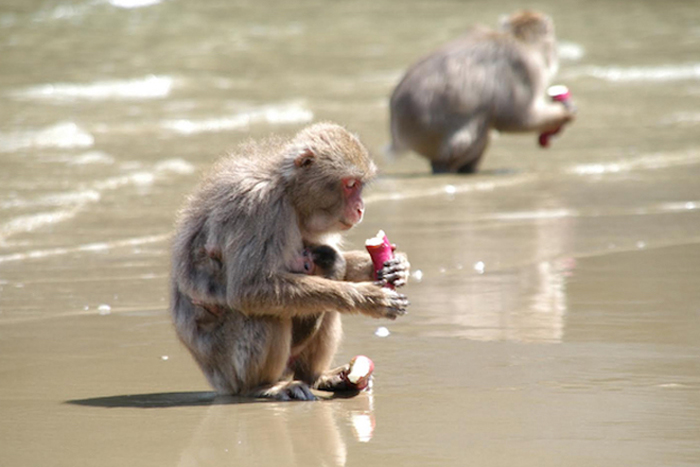Tidy Monkeys Shed Light on Human Cleanliness

Japanese macaques are so tidy that they even wash their food in salt water, and now a new study finds that these monkeys have fewer parasites than other primates that are not nearly as careful.
Female Japanese macaques, in particular, are grossed out by sometimes disease bearing things like poop, suggesting that feelings of disgust help to fuel cleanliness, and thereby healthiness, among all primates, including humans.
The findings, published in the journal Biology Letters, could carry over to other animals with tidy tendencies too.
Animals and Their Tools: Photos
“There are a few other accounts of animals washing food in water, like captive chimpanzees and capuchins, which both seem to wash specifically to remove debris from food items,” co-author Andrew MacIntosh of Kyoto University’s Primate Research Institute and Wildlife Research Center told Discovery News.
“There was even a recent study with zoo-based European wild boars that showed the animals capable of carrying food to water to wash it, a behavior that was restricted to those food items experimentally covered in debris,” he added.
The new study, however, focused on Japanese macaques, which not only wash sweet potatoes in salt water, but also spend much of their days grooming and preening each other.
Sign up for the Live Science daily newsletter now
Get the world’s most fascinating discoveries delivered straight to your inbox.
6 Shocking Things About Chimps
In addition to monitoring cleanliness behaviors and associated parasite loads, MacIntosh and co-author Cecile Sarabian placed both actual and fake feces in the monkeys’ wild habitat. To attract the macaques, the researchers place either a grain of wheat or a nutrient-packed peanut on both the faux and real poo.
Just seeing both types of poo turned off the monkeys, and especially the females. Although hungry, they passed up the wheat.
The monkeys did, however, go for the peanuts, revealing that even a primate known for cleanliness must constantly weigh the risks versus benefits of exposing themselves to something that could pose a health threat.
“You have to remember that these and other terrestrial animals are basically living in the dirt,” MacIntosh said.
Nevertheless, the monkeys seem to go to a lot of trouble to clean off their food by either washing it, as mentioned, when the edibles are covered with sand, or vigorously rubbing and rolling it before consumption.
Chimp Chef Wanna-Be's Reveal Origin of Cooking
Sarabian explained that Japanese macaques live in very humid and warm conditions for much of the year, “conditions which are suitable for the development and transmission of parasites. Animals that do display more cautious behaviors toward potential contaminants may thereby gain a reproductive advantage.”
This could help to explain why females appear to engage in more cleanliness-associated behaviors than males. She quickly added that hygiene is also shaped by experience and culture, “but there is an overall biological pattern to our revulsions.” Good hygiene, as a result, may be due to both nature and nurture.
"What I think is important about this study is that it shows that the tendency to avoid obviously contaminated or disgust-inducing objects is linked somehow with lower parasite levels, at least in adults. The big question is what is the mechanism for this," said Michael Huffman of Kyoto University.
Valerie Curtis of the London School of Hygiene and Tropical Medicine’s Hygiene Center told Discovery News, “I’m really excited to see my theory that disgust evolved to drive behavior that prevents infection born out in experimental work in primates."
“There have been many anecdotal observations of hygienic behavior (in animals), but this is the first experimental demonstration of its likely function in primates, and so it is very exciting.”
Originally published on Discovery News.









